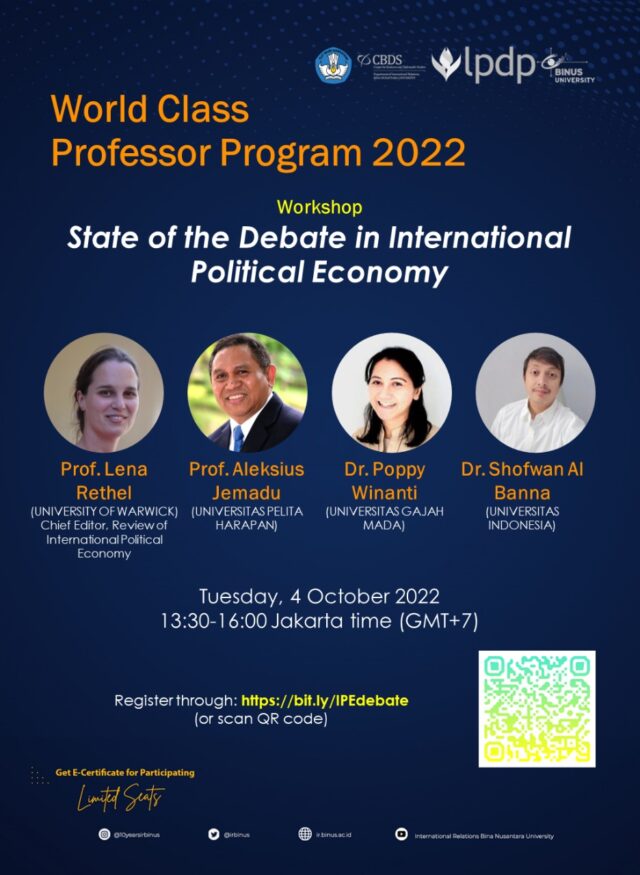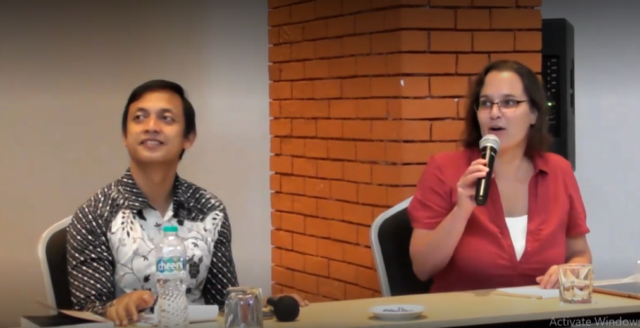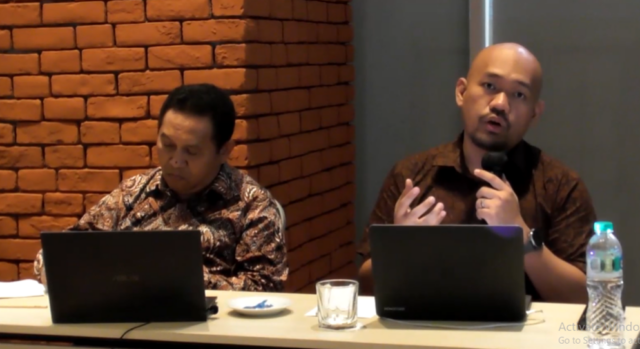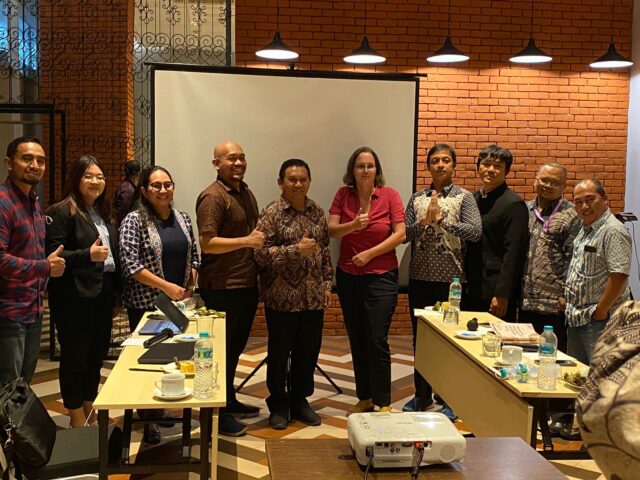IR Binus’ World Class Professor Program 2022
- Centre for Business and Diplomacy Studies (CBDS)
- International Relation Lecture Series
- World Class Thinkers
On Tuesday 4 October 2022 at 13:30-16:00 Jakarta time, Indonesia, the Department of International Relations Binus University through the Center for Business and Diplomatic Studies (CBDS) Binus University held a workshop which is part of the World Class Professor Program 2022 sponsored by the Directorate General of Indonesian Higher Education (DIKTI). This event presented four world-class professors who discussed the “State of Debate in International Political Economy”. The four professors are Prof. Lena Rethel, Chief Editor of the Review of International Political Economy Journal from the University of Warwick, Prof. Aleksius Jemadu from Pelita Harapan University, Dr. Poppy Winanti from Gajah Mada University, and Dr. Shofwan Al Banna from the University of Indonesia.

The event was opened with remarks by Prof. Tirta Mursitama as Vice Rector of Research and Technology Transfer at Binus University and Rangga Aditya, Ph.D. as the Head of the Department of International Relations at Binus University and moderated by Moch. Faisal Karim, Ph.D. as a Faculty Member of the Department of International Relations at Binus University and attended by around 100 participants who joined via the Zoom meeting platform.

Prof. Rethel started the workshop with a presentation entitled “State of Debate in International Political Economy” which focused on the current debate on International Political Economy (IPE), publisher recommendations for IPE works, frequently published topics related to IPE, Indonesia in IPE debates, and his personal research focus on the Islamic economy.
According to prof. Rethel, the debate on IPE now concerns the relationship between “state and the market” to “economic cultures and global flows”, and emphasizes that the IPE debate is very fluid considering the broad characteristics of the discussion itself. In relation to the IPE debate written by Indonesian scholars, one of the criticisms made by prof. Rethel is about the publication of Indonesian scholars who use Indonesian language a lot so that the international exposure is very less. Prof. Rethel then gave a number of IPE debate topics for Indonesian scholars, including those regarding Indonesian economic thinkers such as Tan Malaka, “ibuism”, “gotong royong”, Islamic finance, as well as contemporary topics such as palm oil and the digital economy.

The presentation was continued by prof. Aleksius Jemadu who discussed the weak contribution of Indonesian scholars to the IPE debate and invited them to contribute more. For prof. Jemadu, Indonesia has a lot of potential, especially considering that Indonesia now holds the G20 presidency so that it can also determine the dynamics of international politics. The notions from Prof. Jemadu was then followed by Dr. Winanti commented on IPE as a relatively new science when compared to Security Studies which became the mainstream of International Relations. Through a presentation which is part of her current research focus on climate change and extractivism, Dr. Winanti explained that climate change and extractivism need to be discussed as important IPE topics, especially when it comes to dynamics in the Global South.

The workshop was closed by a presentation from Dr. Al Banna on “Decolonizing Decolonization Agenda” which provoked debate through the topic of “decolonization turn (?)”. This topic highlights the asymmetry of the epistemic community between western and eastern (or now North and South) scholars, while reminding again that the discussion on IPE is related to various changes that have occurred, one of which is due to colonialism. In relation to the topic of IPE, Dr. Al Banna commented on IPE’s Eurocentrism which is considered to have marginalized scholars from the east while stressing that perhaps the IPE study needs to pay attention to the dynamics that occur in former European colonized countries, instead of using the Global South as a data source for case studies for scholars from the west.


